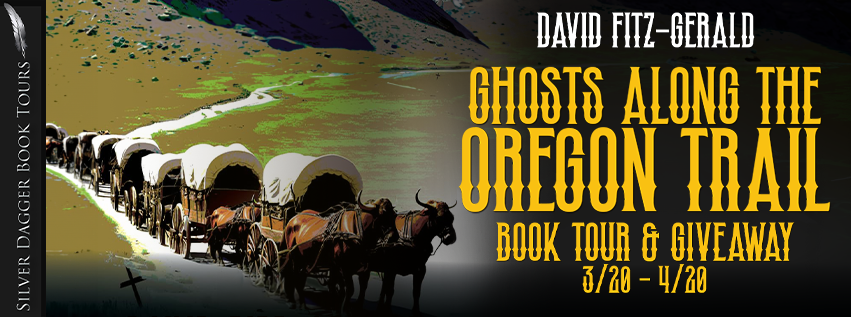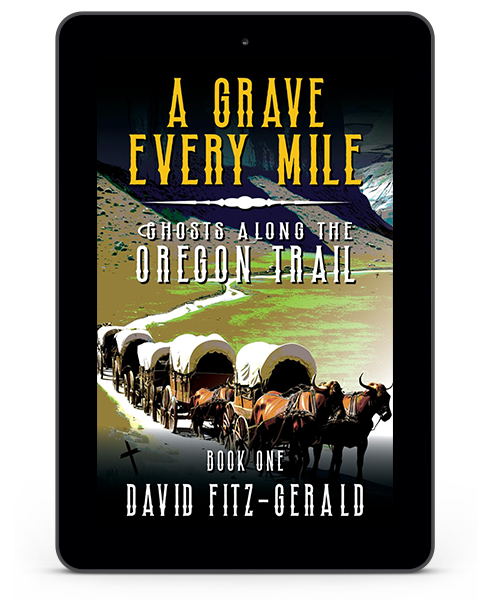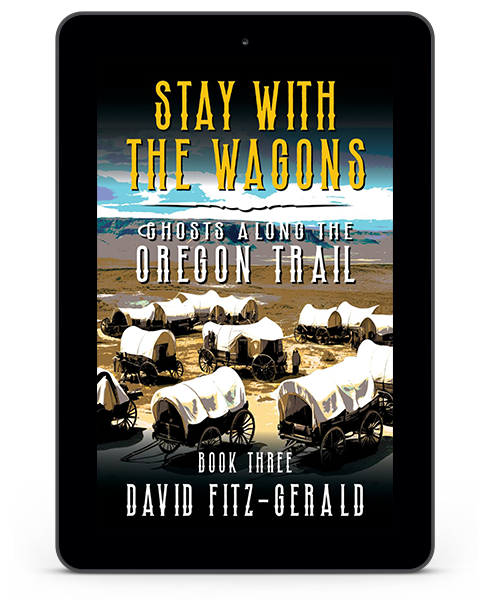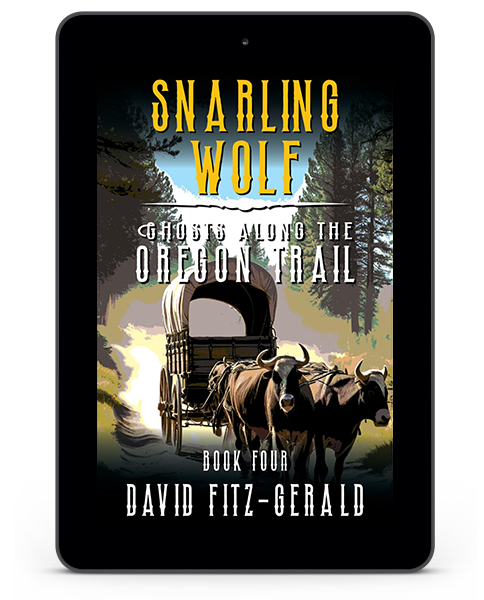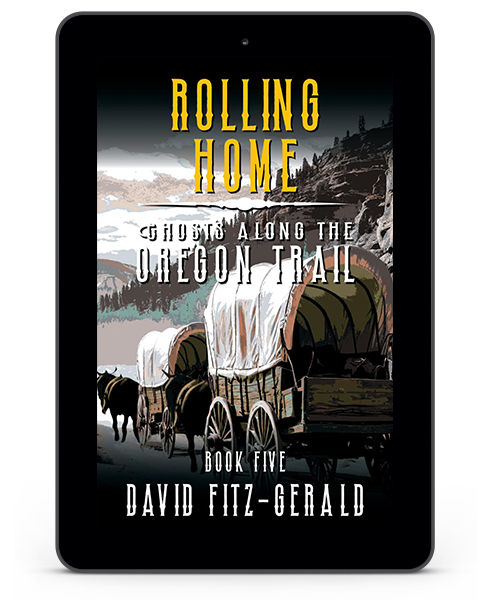Embark on a harrowing trek across the rugged
American frontier in 1850.
A Grave Every Mile
Ghosts Along the Oregon Trail Book 1
by David Fitz-Gerald
Genre: Historical Western Adventure Fiction
Embark on a harrowing trek across the rugged American frontier in 1850. Your wagon awaits, and the untamed wilderness calls. This epic western adventure will test the mettle of even the bravest souls.
Dorcas Moon and her family set forth in search of opportunity and a brighter future. Yet, what awaits them is a relentless gauntlet of life-threatening challenges: miserable weather, ravenous insects, scorching sunburns, and unforgiving terrain. It's not merely a battle for survival but a test of their unity and sanity.
Amidst the chaos, Dorcas faces ceaseless trials: her husband's unending bickering, her daughter's descent into madness, and the ever-present danger of lethal rattlesnakes, intensifying the peril with each step. The specter of death looms large, with diseases spreading and the eerie howls of rabid wolves piercing the night. Will the haunting image of wolves desecrating a grave push Dorcas over the edge?
With each mile, the migration poses a haunting question: Who will endure the relentless quest to cross the continent, and who will leave their bones to rest beside the trail? The pathway is bordered by graves, a chilling reminder of the steep cost of dreams.
A Grave Every Mile marks the commencement of an unforgettable saga. Start reading Ghosts Along the Oregon Trail now to immerse yourself in an expedition where every decision carries the weight of life, death, and the pursuit of a brighter future along the Oregon Trail.
Amazon * Books2Read * Bookbub * Goodreads
From Chapter 1, 626 words
Independence, Missouri, April 13, 1850
I hate it when men fight. After a man throws his first punch, he doesn’t remember why he’s fighting. Where’s the marshal? A town the size of Independence must have a lawman.
A crowd gathers in the rutty street as two men face each other, circling, waiting for an opportunity to swing. The blond combatant hollers in a high-pitched voice, “Take that back, Bobby.”
The dark-haired man, evidently Bobby, shouts, “No, I won’t. You can’t make me.”
The other man shouts, “You can’t talk about my wife like that. I’ll rip your head off.”
“She may be your wife, Wayne, but she’s also my sister. I’ll say what I want.”
Wayne lands a glancing blow on Bobby's cheek. As the punched man’s face turns, I realize these aren’t men. They’re practically boys.
The crowd cheers, encouraging them on. I’ve heard enough. If nobody is going to stop them, I will. My youngest daughter whines as I slide her from my hip, and wails when her feet reach the boardwalk in front of the dry goods store. My twelve-year-old daughter’s eyes reflect trepidation and I reassure her. “Don’t worry, Rose, honey. Hold Dahlia Jane’s hand. Stay right here until I return, and please don’t wander off, for Heaven’s sake.” I glance about to see where my husband and the boys are, but they're nowhere in sight. Not that Larkin would intervene. He would just shake his head and frown.
Two steps from the walkway, in front of the mercantile, my boots meet the muddy, uneven street. Even over the heads of observers, now three deep, I peg the fighters. At times like these, being a woman who is taller than most men is an advantage. As I push people aside, the two men growl at each other. Their arms lock as the evenly matched scrappers transition from fisticuffs to grappling. A trickle of blood dribbles from the corner of Bobby's mouth, and Wayne has a crimson eyebrow.
A tidy-looking young woman catches my attention. First, she addresses the dark-haired man, evidently her husband. “Stop it, Bobby." Then she reprimands her brother. "Knock it off, Wayne. You are creating a scene. Somebody will get hurt.” She glances up at me, her brow furrowed. It seems like a plea for help. I should know better than to interfere in the business of strangers. How many times have I been warned not to get involved? I can never help myself in such situations.
I step toward the snarling bruisers, grab each man by the back of his shirt, and separate them. The scrawny hooligans are surprisingly easy to lift. Maybe they seem so light because of all the years I spent chopping wood. The brown-haired man squirms more than his opponent, who implores, “What are you doing, lady? Have you gone mad?”
“My name ain’t Lady. It’s Dorcas, or Mrs. Moon, if you must.” Their dangling legs barely reach the ground. I clutch wads of fabric in my fists and their feet dance urgently beneath them, trying to find purchase within the muck. I feel like a schoolmarm interrupting a playground scuffle, but these are not children. I gaze into the dark eyes of one boy, then the bright eyes of the other. “What’s gotten into you? I’m sure you know better than to behave like this. What would your mothers think to see you now? You should be ashamed of yourselves.”
The people around us shuffle out of the way, and I’m surprised by an oncoming carriage. It’s too late to duck to the side of the street. A team of shiny black horses swiftly conveys a magnificent rig through a gloppy puddle a few feet from the boys and me, drenching my pink checked dress in pungent mud.
Lighten the Load
Ghosts Along the Oregon Trail Book 2
After a devastating tragedy, Dorcas Moon faces brutal choices in the unforgiving wilderness.
An unsolved hometown murder casts a foreboding shadow over the journey. Mounting responsibilities weigh heavy on Dorcas' shoulders while navigating the trail along the Platte River. Family, friends, and neighbors can't seem to get along without her help.
The gruesome trail exacts a heavy toll. A sweeping grass fire blazes across the prairie. A doomed wagon careens down a treacherous hill. A fellow traveler is gored to death while hunting buffalo. Each disaster pushes the pioneers to the brink. Amidst the chaos, Dorcas grapples with the realization that she must dump her precious cook stove and her husband's massive safe. The oxen can no longer haul the heavy weight of unnecessary cargo.
When her daughter mysteriously disappears while the wagons are at Fort Laramie, Dorcas despairs. She is desperate to help her daughter when the troubled youth is found in the arms of a Brulé man in Spotted Tail's village.
Secure your copy of Lighten the Load and delve into an unforgettable saga of empowerment, sacrifice, and the haunting echoes of the American frontier. Rejoin Dorcas Moon on the adventure of a lifetime as she confronts the challenges that shape her destiny.
Amazon * Books2Read * Bookbub * Goodreads
Chapter 1, 834 words
Independence, Missouri, April 13, 1850
It is late afternoon by the time everyone has completed and stowed their purchases. We’re about to climb into our wagons when we notice townspeople scurrying from the streets and boardwalks, taking cover indoors.
A couple of tough-looking men appear on the street, facing each other, hands hovering at their sides, guns in their holsters. This isn’t like the young men throwing fists a few hours earlier. The air feels thick with tension. I swallow hard and realize that one of the two men is about to die. We hasten around the corner onto Liberty Street just as the sound of gunfire explodes in the air.
I was the last to make it safely around the bend and the first to peek back around the corner.
One man stands, leaning backward, arms stretched and laughing menacingly. The other has dropped where he stood, limbs akimbo, in a heap on the muddy street.
People who had ducked for cover moments earlier return to get a closer look. A thin man in a brown vest steps into the street. Two men follow closely behind him, amble toward the dead body, lift the man from the road, and carry him away like doing so is an everyday occurrence. This town is nothing like the ones back home. Though I don't know them, I'm curious about the quarrel that compelled their duel.
Larkin steps forward, Dahlia Jane in his arms, and says, “Let’s go now. If we survive Independence, the rest of the trail should be easy.”
A shiver halts me briefly, as Larkin’s prediction of smooth sailing ahead disappears into the air. We climb into the wagon and I turn, notice that Rose is missing, glancing about, hoping to spot her. She’s halfway to the place where the gunfighter fell in the mud. I shout for her to come back, but she doesn’t seem to hear me. I leap from the wagon. More mud splatters my dress, but I run to find her.
When I catch up to Rose, she’s rounding the corner, seemingly following the men who carried the dead body. Where are they now?
I’m right beside Rose, yet she still doesn’t happen to hear me. I reach for her shoulders, shake her gently, and repeat her name. She glances at me quickly, then looks back up the street, directly at a building with a sign that reads, “Undertaker.” The foul air reeks of rotten eggs, moldy bread, and hot manure. I guess that’s what decaying human bodies smell like. As the carried corpse disappears within the structure, Rose turns back toward our wagon without a word.
When I catch up to her again, I ask, “Rose, honey. Is there something the matter? Do you want to talk about it?”
She shrugs. “No. Why, Mama?”
I’m confused. It’s like nothing has happened, or she has already forgotten about following the cadaver. I shake my head and wonder where her mind goes sometimes.
Usually, we walk alongside the wagon but this evening, we ride as passengers while Larkin walks beside our team of six oxen, in three teams of two, led by Hardtack, our gentle giant, and Scrapple, his partner.
Larkin never rides in the wagon, because he says it makes him seasick. An hour later, we join a dozen wagons, already settled into an encampment.
Our boys, Andrew and Christopher, who are eleven and nine, tend the oxen, and Larkin pitches a tent beside the wagon. It is harder than usual to make sleeping space among our belongings with extra provisions crowding our confined footage. With limited space inside the vehicle, Larkin and the boys will sleep in a tent, while the girls and I slumber under the cover of a canvas wagon bonnet, crowded by cargo.
Last fall, we left our home, in the Adirondack Mountains of New York State, moving as swiftly as oxen can go, arriving in Missouri before the worst of winter’s weather. We rented a vacant cabin with our friends for a couple of months, living together in tight quarters before striking out again, arriving in Independence early this morning. It's hard to complain about all the things we left behind when everything we own is packed into such a small space. I almost wish we'd left more things behind.
When I finish tucking the girls in, I nestle myself among sacks of provisions and inhale deeply. The rich, sweet smell of cornmeal fills my nostrils and I close my eyes. I should be thinking about rolling forward into the future with my family, but all I can think about is the dashing assistant wagon master, Agapito Huerta Delgado. What kind of a name is that? Where we’re from, nobody has such musical sounding names.
Even if I were unmarried, it would be foolish to think about such a handsome man. My mother always told me that the good-looking ones are nothing but trouble. I tell myself that I am happily married, but sometimes, I am not a good listener.
Stay With the Wagons
Ghosts Along the Oregon Trail Book 3
Venture deep into the uncharted wilderness and crest the continental divide.
Stay with the Wagons is the enthralling third chapter in the Ghosts Along the Oregon Trail series. Dorcas Moon has discarded her mourning dress and yearns for freedom and independence amidst the vast frontier. But a perilous world and a commanding wagon master keep her tethered. Ultimately, it's a brutal bout of fever and ague that confine her to camp.
Relentless disasters and beguiling challenges unfold in this installment. A young man is crushed beneath a wagon wheel. Dorcas' son breaks an arm, a grizzly bear attacks the wagon train, and the looming threat of attacking outlaws whips the emigrants into a worried frenzy. How many must perish before they reach the end of the trail?
As chaos reigns, her troubled daughter, Rose, disappears once again, leading Dorcas on a perilous quest. Tracking Rose to a sacred site, they encounter a blind seer and a legendary leader, Chief Washakie. Rose's enchantment with Native American adornments sparks Dorcas' concern about an unexpected suitor and raises worries about Rose's age.
Stay with the Wagons is bursting with action, adventure, and survival. It is a story of resilience and empowerment on the Oregon Trail.
Claim your copy now and re-immerse yourself in a tale of high-stakes survival, unexpected alliances, and the indomitable spirit of Dorcas Moon.
Chapter 3, 637 words
First day on the trail, April 15, 1850
Our three teams of oxen, led by Hardtack and Scrapple, stand ready to do their job. It takes a while before it’s our turn to begin pulling, with fifteen wagons ahead of us. When the wheels of the wagon before us begin to turn, Larkin cracks the bullwhip and shouts, “Hi-yah!” He snaps the whip again, and the poor beasts lumber forward.
The broody hen squawks in her box. Straps hold the cage in place on a shelf on the wagon’s exterior. Ridge, the devil-eyed goat, blats in protest as the rope that ties her to the back left corner of the wagon drags her along. I can’t see Blizzard, tied to the other corner of the wagon. The children and I begin on foot, following closely behind Larkin.
I hate it when people are cruel to animals. I should hold my tongue, but I cannot. “Must you snap that whip so sharply? It’s barbaric. We should thank the oxen, not whip them.”
“Don’t be ridiculous, Dorcas. I’m not whipping them. I’m whipping the air above them. You know that. We can’t get to Oregon if the oxen don’t move. Don’t carry on like a child.”
Of course, he's right. Somehow, dressing a deer doesn't phase me. I can snap a chicken's neck and pluck its feathers, but the idea of hurting beasts of burden saddens me. “Couldn’t you just tap them lightly on the rump rather than scare the poor creatures?”
“Look, see, we’re already falling behind. We need to drive the oxen faster if we want to get to Oregon before winter.”
“But…”
“That’s enough, Dorcas. Don’t pester me anymore.”
My molars tighten against each other. I know a woman shouldn’t bicker, argue, or nag. Usually, Larkin doesn’t complain about having a garrulous wife. Still, it rankles when he tells me not to pester him.
After walking alongside for half an hour, Dahlia Jane says she is tired. One mile down, one thousand, nine-hundred and ninety-nine miles to go. I lift the child into the wagon. Fortunately, she is content to play quietly by herself.
I walk for a while beside Blizzard. He always seems to listen and understand me when I share my troubles, worries, and complaints. His coat is sleek beneath the palm of my hand. I can never resist stroking his neck. "We’ll take a ride together soon. I promise."
Dahlia Jane hasn’t moved from her nest in the back of the wagon, so I return to walk with the other children. I’m surprised to find Christopher where Larkin was. Larkin is missing. I glance about and don’t see him anywhere. Andrew smiles and says, “Nature calls.” Rose slaps her forehead and looks at her hand to see if she squashed a bug. Christopher seems to have mastered snapping the bullwhip above the oxen, and it makes me cringe even more than when Larkin does it.
After half an hour, Larkin tells Rose it’s her turn. She had been complaining about boredom and appears to have come alive as Larkin calls out her name. “Alright, Rose. Here is the whip. Hold it high and flick it hard with your wrist so that it snaps in the air above the kine.”
Rose asks, “What if I accidentally hit them with it?”
Larkin answers, “Don’t worry. It will not hurt them. They have thick skin and dull nerves.”
I can’t help but say, “Larkin, how do you know how they feel? Please don’t beat our animals.”
Larkin replies, “We’ll try, but the children must learn how to drive them. If you can’t bear to watch, may I suggest you visit our neighbors?”
“Very well, then.” It doesn’t make it any better knowing they whip the beasts while I’m gone, but I pluck Dahlia Jane from her burrow and wander back to the next wagon.
Snarling Wolf
Ghosts Along the Oregon Trail Book 4
Dive back into the gripping, frontier chaos. Snarling Wolf is the fourth adventurous installment in the Ghosts Along the Oregon Trail series.
The famed Snake River marks the point the wagon master claims that all the greenhorns turn loco. After twelve hundred grueling miles and four relentless months on the trail, the expedition teeters on the brink. Frayed nerves, exhausted patience, and the specter of doom cast a dark cloud over the travelers.
At every turn, new dangers emerge. A young man who is like a brother to Dorcas Moon is ravaged in a mountain lion attack. A heat wave grips the dusty, barren plains and spreads sickness. The wolves that lurk in the shadows edge closer. Even the rattlesnakes seem emboldened.
Dorcas' daughter, Rose's descent into madness can no longer be ignored. What began as an eerie preoccupation with death takes a shocking turn when Rose reveals her truths. Dorcas is thrust into a realm of disbelief, and her worst fears about Rose's mysterious suitor become a stark reality.
As weary emigrants yearn for respite, tales of murderous outlaws spread like wildfire across the prairie. Passing strangers share the latest terrifying news. It's only a matter of when, not if, the notorious highwaymen will strike. Which bend of the mighty snake shelters the feared outlaws?
Grab your copy of Snarling Wolf now and unveil the next chapter in Dorcas Moon's relentless saga. Sink your teeth into this tale of survival, madness, and the unyielding spirit of those who brave the treacherous migration.
Chapter 4, 1386 words
Lone Elm, April 16, 1850
The unrelenting rain makes everything invisible, and I am surprised when the wagon in front of us finally comes to a halt. The wagons have circled, and I didn’t even know we had reached our destination.
It is still pouring, and Larkin insists that the boys grease the axles. I plead with him to let the boys alone. “Climb in the wagon and rest. We need a break, Larkin.”
“No, Dorcas. It doesn’t matter how miserable or sick we are. We must take care of the wagon. I’ll get the wagon jack.” We share it between our five wagons, and since Stillman and Carter’s wagon has the lightest load, they carry it in their rig.
Like everything else today, the task is more challenging than usual. The wagon jack sinks and tilts in the mushy earth. The boys place thick saplings underneath the jack and crank the wagon up enough to remove the wheels. Though they must be tired, they take the jack and muddy saplings to Cobb and Jennie’s wagon and help them. Finally, Larkin and the boys return. I have nothing but hard biscuits, cold ham, and water for their supper. It is hard to cheer up a miserable family with cold food.
We’re eager to get out of the rain, whereas Rose and Dahlia Jane have spent all day in the wagon. They are impatient to get out, even though it is wet.
I walk with the girls a short distance from the wagon to answer the call of nature. It is enough of a challenge as a lady, even under the best of circumstances. Typically, we would pay more attention to who might be watching or where we might be in relation to other people. Instead, we hurry when we should be careful.
After the girls finish, I attempt a squat. At the worst possible moment, my feet slip. I fall backward, and my naked rump lands in thick, squishy mud. I am unspeakably soiled and miserable to my core. I grit my teeth, trying not to complain. I’ll have to go back to the wagon and get a towel.
Ten feet from the wagon stands a cross, fashioned out of tree branches, strapped together with twine where they join. A pile of earth and stones lay in front of the crude crucifix. The weathered sticks tilt slightly to the left. The dirt pile doesn’t look large enough to be an adult’s final resting place. I think of the poor traveling family that must have lost a child here. Perhaps it was last year. I say a quick prayer in my head and continue to the wagon. I turn to help Dahlia Jane up, and she’s missing. Rose is gone too.
Doubling back, I find them standing beside the grave, hand in hand. The hood on Rose’s raincoat rests on her back. Her head lolls forward, and her stringy wet hair dangles all about, obstructing the view of her face. I prod, “Come along, girls.”
Rose drops Dahlia Jane’s hand and waves me away without looking up. Rose sniffles as I rush the toddler away and lift her into the dry wagon. I rifle around, find a small towel, and shove it into the pocket of my skirt. Rose still stands beside the child’s grave. I drape my arm across her shoulder, and she twists away from me. “I’m sorry, Rose. I know it is awful to imagine such a tragedy.”
Larkin appears beside me with the boys.
Rose says, “Leave me alone,” turning her back to us.
I turn toward Larkin and gesture toward Rose with open hands, imploring him to do something.
Larkin says, “Let her be. She’ll learn to deal with the idea of death on her own. We all do, someday.”
I protest. “I’m sure that Rose has many questions. I think we need to talk about this.”
He responds, “This is not the time or place.”
Rose turns halfway back toward us. She says, “I don’t want to talk about it. I just want to be alone for a while.”
Nevertheless, I step forward. Larkin raises his voice. “Let her be, Dorcas.”
I want to shout back at him, but think better of it. I say, “Rose, honey. Let me know if you need me. I’m happy to listen if you want to talk.”
Rose squats in front of the child’s grave like she’s about to warm her hands near a campfire. I look at Larkin. I have a sinking feeling in the pit of my stomach. My child needs something, I’m powerless to help her, and I haven’t the slightest idea what’s bothering her. It has been this way ever since she turned twelve.
Larkin points to the wagon with his chin, again telling me to leave Rose here, alone in the rain. I say, “I’ll be along in a few minutes.” Thick fog swallows me as I walk away from camp. I will not feel clean until I have a proper bath. I picture myself squatting on the prairie as I clean myself the best I can with a small towel and pray for an end to the rain.
When I return to camp, I see Rose waltzing about near the child’s grave. She leans down and forward like she is dancing with an imaginary friend. I cover my mouth with my hand. I can’t help thinking that Rose is losing her mind, and there’s nothing I can do to stop it. Larkin says to ignore her. I know he’s wrong, but I can’t think of anything that will work, and every time I try, Rose pushes me further away. I back away toward the wagon and shiver, thinking of my poor child, obliviously dancing in the icy rain.
I climb into the back of the wagon, which was never intended to house a large family. We huddle inside, glad to be out of the rain, snuggling together under blankets.
It's hard to leave a child alone in the wilderness, exposed to the elements. I plead, “Larkin, Rose is out there, and I couldn’t get her to come in. I don’t know why she doesn’t have the sense to come in out of the rain. I think you should go get her.”
Larkin shakes his head in disagreement. In an even tone, he says, “I’m sure she will return soon. We can’t let her ride in the wagon all day, even during bad weather. She’ll come in when she gets cold enough. You can’t coddle the children all the time, Dorcas.”
Do all men say such things? I counter, “But Larkin, there’s something wrong with Rose, isn’t there? Can’t you see that?” I don’t want to say more with the other children listening.
Dismissively, he replies, “I’m sure it’s just a phase she’s going through. You mustn’t worry so.”
I pass out biscuits and dried apples. Dahlia Jane asks Larkin to read to her. Andrew scratches words onto lined paper. “I didn’t get to post the news today, Mama. I’ll have to post two issues tomorrow.”
Larkin is right. Rose climbs into the wagon, dries her wet hair with a towel, and changes into her second dress beneath the cover of a blanket. Without a word to anyone, she begins writing in her diary. It has never occurred to me to read her private thoughts, but now I wonder whether I should.
As pitch-black darkness envelopes us, the children put their books away, close their eyes, and sleep. There isn’t room for Larkin and me to stretch out, so we slump against each other and fall asleep slouched against our provisions. The corner of a wooden box presses into my back, and I can’t seem to wriggle away from it.
Sleep comes in brief installments. The night seems as long as the day. I’m startled by a loud knocking on the side of the wagon. A man’s voice shouts over the rain. “Larkin, it’s your turn to take watch.”
Larkin grumbles as he rises, puts on a raincoat, and disappears into the night. I feel sorry for him. Of all nights to have to stand watch. What can he see or prevent anyway? Then I feel guilty, enjoying the extra space, as I stretch my body, wedge between warm, sleeping children, and fall fast asleep.
Rolling Home
Ghosts Along the Oregon Trail Book 5
Climb aboard! Don't miss the heart-pounding climax of the Ghosts Along the Oregon Trail series. Rolling Home is the final installment.
In the heart of the rolling village, dissent brews as the stubbornest naysayer refuses to continue the journey. With an ominous early snowfall and memories of the ill-fated Donner Party haunting the pioneers, Dorcas Moon faces a new wave of challenges. Just when she believes things can't get worse, a disastrous river crossing claims their wagon and submerges their belongings.
As the rolling village approaches the final leg of the journey, the looming threat of outlaws intensifies. The notorious bandit known as The Viper and his ruthless brothers are determined to rob the greenhorns, sell their stock, and kill every last one of them. The pioneers had heard tales of their brutality, but now, with Dorcas' daughter kidnapped and Dorcas captured, everyone is in danger.
What will become of Dorcas Moon, her family, and their friends? Will anyone survive the perilous journey?
Rejoin the expedition and witness the thrilling end to a gripping saga.
Chapter 16, 691 words
Cottonwood Creek, April 28, 1850
When I return to our wagon to launder dirty clothes, Andrew and Christopher complain that they can’t find Rose. They were hoping to leave Dahlia Jane with their sister, but Rose is missing, again. I ask Larkin where Rose is, and he throws his arms up as if aggravated about being asked. “I’m sure that she’ll turn up when she’s done being wherever she is. That’s how children are.”
Ignoring Larkin, I step into the wagon master’s camp and ask if they’ve seen Rose. Arikta tells me that he saw her about an hour ago. He points to the southwest and says she was walking along Cottonwood Creek. The serious-looking scout grows even more intense. “I can track her for you.”
Recalling the proper hand signals, I put my hands flat in front of me, palms down, and move them together in a downward arc away from me. Arikta smiles and says, “You are welcome, Dorcas.”
If I weren’t concerned about my missing daughter, I would enjoy walking with Arikta along the creek bed. Every so often, he stops and shows me a sign that she has passed by. His trained eye doesn’t miss the broken twigs and parted grasses that show where someone has been. After an hour, he points at an odd-looking structure above the creek’s bank. “There,” he says.
A giant, twenty-five-foot-high mound of earth stands above us. Arikta says, “My people live in these earth lodges. This one is abandoned. Do you think that Rose would go inside?”
I nod. That’s exactly where I expect to find Rose. There is a short tunnel in front of the earth mound, also made of dirt. The mouth looks like a doorless entrance with long sticks propped against both sides.
We climb the creekbank, and Arikta tells me to wait. He scampers to the top of the mound. Then he flips a rigid cover from its summit and returns to my side. He looks at me and says, “Let’s go in, Dorcas.”
I’m amazed by what we find inside. A beam of bright light pours through the hole at the peak of the mound. Rose kneels on an animal skin in front of a circle of stones, a fire pit with no smoke or flames. She nods her head to the beat of an unheard drum. I say her name, but she doesn’t seem to hear me. I’ve come to expect such odd behavior from her. I breathe deeply, feeling like a trespasser.
Arikta whispers as if he doesn’t want to disturb Rose. “My family lived here many years ago.”
I look at him, place a hand on his arm, and then look around the structure. Giant timbers form a square, like support beams, around the fire circle. Red, white, black, and yellow painted posts support a roof constructed of timbers that radiate around the structure. Behind those long poles, woven saplings hold back the dirt outside. Blankets hang around the perimeter above what looks like sleeping chambers. I think the earth lodge looks occupied rather than long abandoned.
Arikta whispers. “A lot of people lived here before the smallpox epidemic.”
“I’m so sorry, Arikta. Thank goodness you survived.”
“Yes. We were away, hunting buffalo when everyone here died. Very sad. We buried their bones when we returned.”
Rose stands and walks around the structure. As she pauses beside each compartment, she pulls back each blanket as if listening to people behind the drapes before moving to the next. When she finishes, she returns to the center, stands in the middle of the fire circle, looks directly through the hole above, and spreads her arms wide.
Then she drops her arms, slapping her sides. She looks around, sees us, and says, “What is this place?”
Arikta answers her. “This is a Pawnee earth lodge, Rose. It was my family’s home.”
She says, “You have a nice family, Arikta.”
Rose turns to face the exit and walks through it, returning the way she came, along Cottonwood Creek. It seems like she has forgotten that we are following her. Arikta and I look at one another, shrug, and follow Rose into camp.
David Fitz-Gerald writes westerns and historical fiction. He is the author of twelve books, including the brand-new series, Ghosts Along the Oregon Trail set in 1850. Dave is a multiple Laramie Award, first place, best in category winner; a Blue Ribbon Chanticleerian; a member of Western Writers of America; and a member of the Historical Novel Society.
Alpine landscapes and flashy horses always catch Dave’s eye and turn his head. He is also an Adirondack 46-er, which means that he has hiked to the summit of the range’s highest peaks. As a mountaineer, he’s happiest at an elevation of over four thousand feet above sea level.
Dave is a lifelong fan of western fiction, landscapes, movies, and music. It should be no surprise that Dave delights in placing memorable characters on treacherous trails, mountain tops, and on the backs of wild horses.
Website * Facebook * X * Instagram * Bookbub * Amazon * Goodreads
Follow the tour HERE for special content and a giveaway!
$20 Amazon
